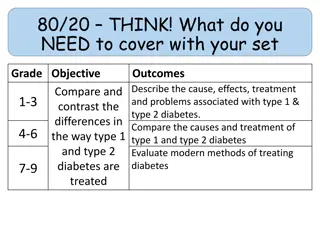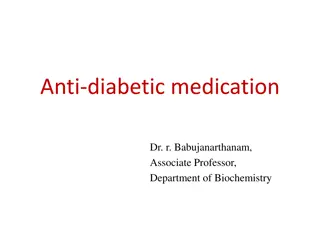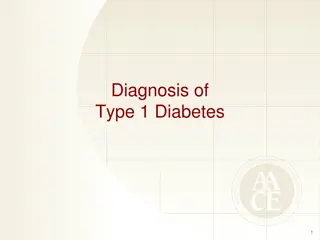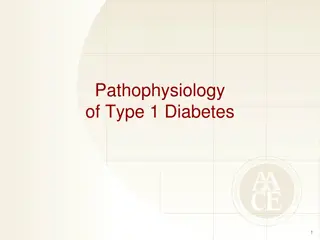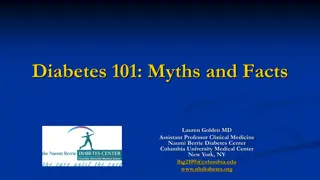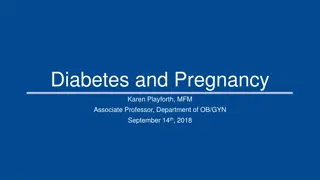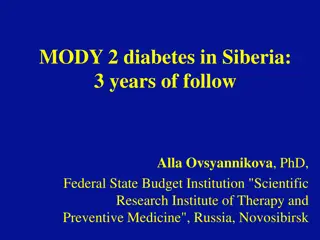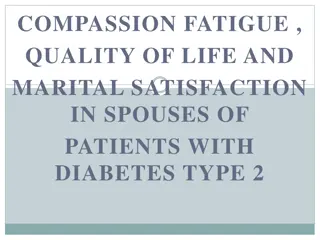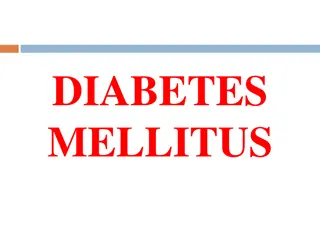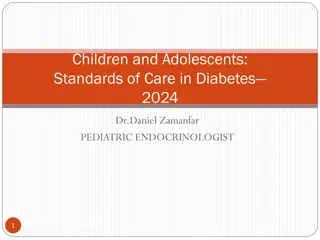Type 2 Diabetes and Genetic Research
Type 2 diabetes is a condition where the body resists insulin or doesn't produce enough. Explore the genetic research on SNPs and GWAS related to diabetes, including findings from multi-ethnic populations.
Download Presentation

Please find below an Image/Link to download the presentation.
The content on the website is provided AS IS for your information and personal use only. It may not be sold, licensed, or shared on other websites without obtaining consent from the author.If you encounter any issues during the download, it is possible that the publisher has removed the file from their server.
You are allowed to download the files provided on this website for personal or commercial use, subject to the condition that they are used lawfully. All files are the property of their respective owners.
The content on the website is provided AS IS for your information and personal use only. It may not be sold, licensed, or shared on other websites without obtaining consent from the author.
E N D
Presentation Transcript
Type 2 Diabetes With type 2 diabetes, your body either resists the effects of insulin a hormone that regulates the movement of sugar into your cells or doesn't produce enough insulin to maintain a normal glucose level.
High blood glucose Insulin secretion from pancreas Eat Glucose absorption by muscle Low blood glucose
Analyzed genome sequence of Steve Quake Rare protein altering SNPs But usually do not know what the gene does, so difficult to know if the mutation is causing a trait. Common SNPs Analyzed Steve s SNPs for risk at common diseases The known SNPs are all from GWAS GWAS all use DNA chips, not genome sequence Association only works for common SNPs For common SNPs, Steve could have gotten essentially the same information from a 23andme chip.
Type 2 Diabetes GWAS Date 2008 2010 2010 2012 2014 # cases 10K 46K 42K 34K 26K trait T2D IR T2D T2D T2D SNPs 16 17 23 33 76
MARCH 2014 Nature Genetics 26,488 cases (T2 D) and 83,964 controls European, east Asian, south Asian and Mexican and Mexican American ancestry. Confirmed 69 previous SNPs associated with T2D Found 7 new loci for T2D using multi-ethnic populations
The causal mutation/gene is hard to identify from GWA studies Purple: Lead SNP Red: R2 > 0.8 Causal mutation? Affected gene?
Mutation landscape in diabetes gene Cases Controls
SLC30A8 andType 2 Diabetes SLC30A8 encodesan islet zinc transporter zinc transporter ZnT8 p.Trp325Arg is a missense change with a 30-50% minor allele frequency p.Trp325Arg is thought to be a weak mutation and partially reduce ZnT8 function p.Trp325Arg is associated with 1.2x risk for type 2 Diabetes, fasting glucose and insulin levels If weak alleles of SLC30A8 result in a mild risk for Type 2 Diabetes, might strong (null) alleles have a high effect on Type 2 Diabetes?
Strong (null) alleles of SLC30A8 show strong protection from Type 2 Diabetes Sequenced SLC30A8 in many people. Found 12 strong loss-of-function mutations stop mutations and splice site mutations Heterozygous carriers for a SLC30A8 null mutation show 65% decreased for Type 2 diabetes Much stronger effect than the common allele Effect was opposite to expected. Null alleles lead to decreased rather than increased risk for Type 2 diabetes.
Mutation landscape in SLC30A8gene Cases Controls
Rare mutations in GWAS genes do not explain the missing heritability for Type 2 Diabetes Sequence SLC30A8 in 145K people, and only 345 had mutations. Sequenced 115 GWAS genes in diabetics. Only SLC30A8 had mutations
Maturity Onset Diabetes of the Young (MODY) MODY is a good candidate for personal genomic screening for several reasons: (i) it is caused by dominant Mendelian mutations, such that heterozygous carriers develop disease; (ii) clinical presentation occurs early in life (<25 years) with nonketotic hyperglycemia (iii) the frequency of MODY is 0.1 0.2% in European populations, with the majority of affected individuals being undiagnosed or misdiagnosed; (iv) MODY diagnosis can substantially affect diabetes prognosis and treatment of the individual or affected family members (v) mutations in MODY genes also influence late-onset phenotypes, as common variants near many of these genes are associated with type 2 diabetes (T2D) risk in the general population (vi) this risk can be reduced by lifestyle intervention.
MODY genes People with MODY often have mutations in these seven genes: HNF1A30, GCK31,32, HNF4A33 HNF1B34 PDX1 INS36 NEUROD1
What is the penetrance of the MODY genes? Penetrance the fraction of people with the mutation that have MODY. sequenced seven genes for maturity-onset diabetes of the young (MODY) in 4003 people. 35 strong loss-of-function (pathogenic) mutations found in these genes None of the 35 carriers had MODY. Conclusions: MODY is very rare (~1/1000). These genes greatly increase the risk of MODY (10x). But carriers still have a low overall chance of getting MODY (1/100).




